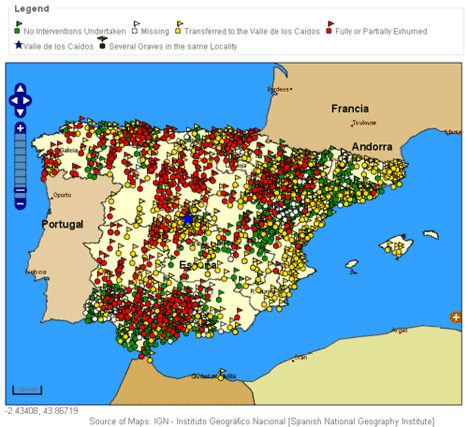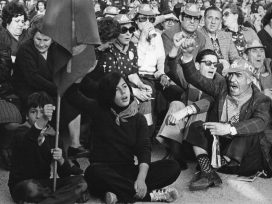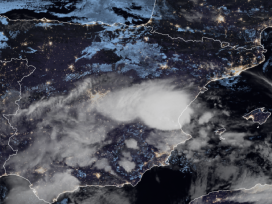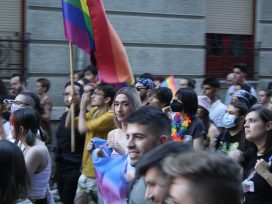The Civil War and Franco’s dictatorship are being talked about in Spain at last. At least this is the claim being made in much of the international media, and many Spanish people seem to be thinking the same. Spanish society, they say, is ridding itself of the amnesia and “pact of oblivion” which gripped it in the first two decades of democracy. So what is happening in Spain? Why this sudden enthusiastic interest in the recent past, the Civil War, the dictatorship and its victims?
Francisco Franco, who ran a dictatorship in Spain for almost forty years, died of natural causes in November 1975. After his death, there was no talk of setting up truth commissions to investigate the thousands of murders and human rights violations committed during the dictatorship – unlike in the countries of the Southern Cone, particularly Chile and Argentina, where truth commissions laid the foundations for the reconstruction of democracy and collective memory following the military dictatorships. Nor were the alleged perpetrators of these violent acts brought to trial. Some think that this lack of “official truth” marks the difference between Spanish democracy and the democracies in South America. But it is not as simple as that. Let us look at history, memory and forgetting, and how it has influenced debate and political squabbling in the present day.
History
In the first few months of 1936, Spanish society was highly fragmented, with uneasiness between factions and, like elsewhere in Europe, a widespread rejection of liberal democracy in favour of authoritarianism. Yet none of this need have led to a civil war. The war began because a military rebellion against the republic undermined the ability of the state and government to maintain order. The division of the army and security forces prevented the military achieving its main objective: the rapid seizure of power. Yet by undermining the government’s ability to maintain order, the coup d’état transformed into unprecedented open violence between groups that supported it and those that opposed it. It was July 1936 and thus began the Spanish Civil War.
The Spanish Civil War has gone down in history and in memory for the way it dehumanised its adversaries and for the horrific violence that it generated. Lawless, arbitrary shootings and massacres eliminated enemies, real or presumed, on both sides. If we go by the meticulous research carried out in the last few years, there were at least 150 000 victims who paid with their lives for the violence: close to 100 000 in the zone controlled by the military rebels and somewhat fewer than 60 000 in the Republican zone.
The nationalists’ policy of extermination of the Left was approved by a large conservative section of society. Many on the Left, meanwhile, saw in the failure of the military coup the hour of revolution and final judgment against the rich, and class hatred and vengeance spread like wildfire. The military rebels were given the blessing of the Catholic Church from the very beginning, however the clergy and sacred property were also the prime target of those who took part in defeating the military rebels and who played leading roles in the “popular terror” during the summer of 1936. Catholicism and anti-clericalism were thus major components of the battle being unleashed on Spanish territory over basic questions regarding the organisation of society and the state.
There were various conflicts involved. It was a war between classes, between different conceptions of the social order, between Catholicism and anti-clericalism, over the idea of nation, and over ideas and creeds that dominated the international scene at the time. The Civil War crystallised worldwide battles between landowners and workers, between Church and State, and between obscurantism and modernisation, which were also being fought out elsewhere between communism and fascism, while the debilitated democracies looked on.
The international situation was not conducive to peace, and this affected the war, in its origins and internal dynamic. International support for both sides was vital in keeping the conflict going in the first few months. When the war began, the democratic powers were attempting to “appease” the fascists in Europe, especially the German Nazis. The Spanish Republic therefore had to wage war against an army favoured by the international situation. Dictatorships under the rule of a single man and a single party had substituted democracy in many countries and, except in Russia, all these parties were on the Right. Six of the continent’s democracies were invaded by the Nazis the year after the Civil War ended. Spain, then, was no exception in a continent ruled by the authoritarian Right. But this cannot excuse a wide sector of Spanish society, the political and union leaders, soldiers and churchmen, who did nothing to develop a civic culture of respect for the law, for electoral results, for freedom of expression and association, and for civil rights.
Many Spaniards saw the war as a horror from the start; others felt they were in the wrong zone and tried to escape. Some figures in the Republic did not take sides, forming a “third Spain”. But millions of people were forced to take sides, some getting their hands dirtier than others. There is, then, no simple answer to why such barbarity broke out. Spain began the 1930s with a republic and ended the decade under an authoritarian rightwing dictatorship. Whatever we may say of the violence that preceded the Civil War, it is clear that in Spanish history there is a before and after to the coup d’état of July 1936.
Nationalists and Republicans had such different ideas of how to organise the state and society, and were so committed to their aims, that settlement was difficult. Franco’s victory was also a victory for Hitler and Mussolini, and the Republic¹s defeat a defeat for democracies. Following this, there was no attempt at reconstruction in Spain, as had occurred in western Europe after 1945.
The Spanish civil war was followed by a long uncivil peace. The official end of the war on 1 April 1939 did not put a stop to violence. It saw the end of the political and class struggle, of the parliamentary system, of the lay Republic and of revolutionary atheism – all these demons interred by Franco’s armed victory under divine protection. With the Reds captive and disarmed, Spain began a new era, which was to see the end of this “unclean” history of political pluralism, liberalism and foreign philosophies. In the post-war era, the elimination of the defeated became the Francoist army’s absolute priority. The destruction of the defeated opened up broad political and social opportunities and provided the victors with vast benefits that formed the basis of the power of Francoism.
Thus began a new period of mass executions, prison and torture for thousands of men and women. Death was unleashed with total impunity, the same impunity that had guided the massacres undertaken by the military rebels since July 1936. At least 50 000 people were executed in the decade following the end of the war, without counting the thousands of deaths caused by hunger and disease in the various prisons. The collapse of the Republican army in the spring of 1939 meant that hundreds of thousands of prisoners were sent to improvised concentration camps scattered over the Spanish countryside. In late 1939 and throughout 1940, prisoners numbered over 270 000, according to official sources, a figure that declined in the following two years as a result of the thousands of executions and deaths from illness and starvation. The exodus of the defeated population also left its mark. “The withdrawal”, as the great exile of 1939 was known, saw some 450 000 refugees fleeing to France in the first three months of that year, of whom 170 000 were women, children and the elderly. Some 200 000 returned in the following months, to continue their living hell in the Francoist dictatorship prisons. It was, in short, a purge that dismantled the culture and social foundations of the Republic, the labour movement and secularism.
The dictatorship made sure that its victory was always evident. It peppered the whole territory of Spain with memorials and dealt out ruthless punishment to the vanquished, their children and their children’s children. The churches were filled with plaques commemorating those who had “fallen in the service of God and the Fatherland”. However the names of the tens of thousands murdered by the military and fascist terror were never commemorated, not even on a humble tombstone. The defeated were frightened even to claim the bodies of their loved ones.
During the first two decades of the transition to democracy, revealing this brutal history was almost exclusively the work of a diverse group of historians who, on the basis of new sources, discussed ways of interpreting the past and began to compare it with what had occurred in other societies. These studies were disseminated within academic circles and they changed and substantially enriched knowledge about this long period of contemporary Spanish history. However the arguments and conclusions failed to reach a wider public and were of scant interest to the media.
The winning side’s versions gradually became outdated and discredited, mainly because they were poorly argued, its principal apologists either dead or retired. With the exception of military history, a sphere in which Francoist authors always felt at home, almost everything that is known today, over seventy years after the beginning of that conflict, is the result either of the work of Hispanists, particularly from Great Britain and North America, or of a new generation of historians who came to the Spanish universities at the end of the dictatorship and in the early years of the transition to democracy. There was no “quarrel of the historians” in Spain, as there was in Germany, because collective responsibilities were less intense and less international, and historiographic revision, with its lights and shades, meant the almost unanimous abandonment of the ideas that were the cogs of the Franco dictatorship’s propaganda machine.
This abandonment might be said to be the distinguishing trait of historians who work in Spanish universities, publish books and conduct research. While we may argue about the best way of characterising the dictatorship, or about memory and forgetting, to name but two of the issues that have taken up most of our time, almost all of us have rejected the ideological baggage bequeathed to us by Francoism, which is nevertheless still carried by journalists and rightwing politicians.
Memory
But the history of the Civil War and the dictatorship is no longer the exclusive preserve of historians, and there are now many people who wish to address this past in political terms and, in the case of the descendants of the victims, in ethical terms. Mass graves have begun to be opened in search of the remains of victims who were never registered and a number of magnificent documentaries have been made that unearth aspects of this past that have been hushed up the most. This represents a new social dimension for history, with testimony playing the main role.
The traumas, wars and dictatorships of the past tend to cause conflicts between different memories, both individual and collective, different ways of perceiving history. Although many Spaniards think that having divided, opposing memories only applies to them, this rift has occurred, and is still present, in every country that suffered criminal political regimes, such as Nazi Germany, Stalinist Russia, the military dictatorships of the Southern Cone and Franco’s Spain. In these cases, as Ernst Nolte, the conservative German historian, stated some twenty years ago with regard to Nazism, “the past will not pass away”. Historical memory, far from being neutral territory, has become a cultural, symbol-appropriating, political battlefield.
The society that emerged from Francoism and grew in the first two decades of democracy displayed marked signs of indifference towards the cause of the victims of the Civil War and the dictatorship. With the Amnesty Act of 15 October 1977, the state ruled out any future legal inquiries into “crimes committed by public servants violating human rights”. The traumatic memory of the war, interpreted as a type of collective madness with abominable crimes in both camps, together with the fear imposed by the dictatorship, meant there was no talk of setting up truth commissions to investigate the thousands of killings and systematic violation of human rights practised up to the end by Franco and his armed forces.
For various reasons, the battle to uncover the hidden past, to learn the truth and demand justice were never distinguishing features of the transition to democracy in Spain, despite the efforts of historians to analyse those events and pass their findings onto future generations. Spain was full of lieux de mémoire for the victors of the Civil War, with the Valley of the Fallen, the monument built by Franco in April 1959 to commemorate the Civil War, holding pride of place. These were places to defy “time and forgetting” as the Francoists used to say, tributes to the sacrifice of the “heroes and martyrs of the Crusade”. The other dead, the tens of thousands of Reds and unbelievers murdered during the war and post-war period, simply did not exist. No government or democratic party showed any interest in encouraging debate over redressing this injustice. Nor was there any strong social pressure to reverse this official disregard for the crimes of the Francoist dictatorship.
This began to change, gradually, during the second half of the 1990s, when previously unknown facts and figures regarding the victims of the Civil War and Francoist violence came to light. This coincided with the growing importance that international opinion was giving to debates on human rights and the need for remembrance of wars and dictatorships following the end of the Cold War and the disappearance of the communist regimes of eastern Europe. Thus emerged a new social construction of memory. A section of society began to mobilise, associations for the recovery of historical memory were set up, mass graves were exhumed in the search for the dead who were never registered, and the descendants of those killed by the Francoists, more often their grandchildren than their children, began to ask what had happened – why this story of death and humiliation had been covered up and who the executioners had been.
The past refused to go away, although measures taken to preserve and transmit the memory of these victims, and especially to see that they were publicly acknowledged and received moral redress, met a good many obstacles. With the Partido Popular in power and José María Aznar as Prime Minister from May 1996 to March 2004, such measures were not possible in view of the links that some of the party’s politicians had previously had with the dictatorship. Meanwhile, in the final years of the twentieth century and first few years of the twenty-first, several hundred Catholic clerics “martyred” during the Civil War were beatified. Nothing has changed: honour and glory for some, silence and humiliation for others.
Politics
The arrival of a socialist government under José Luís Rodríguez Zapatero opened a new era. For the first time in the thirty-year-old democracy, politics was to take the initiative in redressing this historic injustice. This was the prime significance of the bill introduced at the end of July 2006, later to be known as the Ley de Memoria Histórica (The Historical Memory Act). This led to memory being discussed more openly than ever before, and the past was to become a lesson for the present and the future. The bill did not deal with different interpretations of the past: it was not trying to define responsibility or point the finger of guilt. Nor did it propose a Truth Commission, as had been set up in other countries to register the mechanisms of death, violence and torture and identify the victims and their executioners.
Even so, it provoked strong reaction from the opposition Right (Mariano Rajoy, the leader of the PP, stated that his party would repeal the Act if it came to power), the Catholic Church and its media outlets. Esquerra Republicana (the Catalan Republican Left party) rejected it because it failed to call for the quashing of Francoist trials, while the moderate Basque and Catalan nationalists also imposed their conditions: the former requiring the return of Basque government documents held in the Archive at Salamanca, the latter calling for clearer acknowledgement of crimes and violence on the Republican side.
Spanish democracy needed this act, which was finally passed on 31 October 2007, and while it did not go far enough, it did open new avenues for moral redress and legal and political recognition for the victims of the Civil War and Francoism. In October 2008, judge Baltasar Garzón, under the terms of the act, applied to investigate the circumstances of the death and whereabouts of thousands of victims of the civil war and the dictatorship, many left by their killers in roadside ditches, against cemetery walls, buried in mass graves – all murdered without trial or legal safeguards. Since the political class had never taken legal and political recognition of these victims seriously, it fell to a judge to take the initiative, the same judge, incidentally, who had taken action against the Grupos Antiterroristas de Liberación (an anti-ETA death squad), sent hundreds of ETA terrorists to prison and ordered the arrest of Augusto Pinochet.
Instead of allowing this shameful history of political assassination to be investigated, and instead of trying to understand and explain why it occurred, condemn and learn from it, a certain sector of judges, politicians and the media began a harsh persecution of Baltasar Garzón, culminating in May 2010 with his suspension and disqualification for allegedly exceeding his powers in investigating the crimes of Francoism.
Following a complex transition, littered with conflicts and obstacles, democracy changed Spain’s position in Europe, thus fulfilling one of the dreams held by the Spanish intellectual elite since the end of the nineteenth century – Spain’s full integration within Europe. The challenge facing the Spanish people in the twenty-first century is no longer about creating full democracy with equal rights and freedoms, the occasionally bloody aspiration of some of the generations that preceded them, but about continuing with this transformation in order to strengthen civil society and citizen involvement.
Over thirty years after the death of the dictator, Spanish society has managed to leave behind some of the basic problems that had most concerned it in the past. But from his tomb, Franco still seems to be showing the way with regard to other problems that are just as important. The Valley of the Fallen was and remains a memorial to Franco, with democratic governments unable to establish a coherent policy for handling this legacy. Unbiased viewing of this traumatic past and the issue of political, legal and moral redress for the victims of Francoist violence generate rejection and obstruction from powerful groups firmly entrenched in the judiciary, politics and the media. And the hierarchy of the Catholic Church, which managed to preserve the privileged situation it had enjoyed under Franco, jealously clings on to its financial resources and the monopoly it had acquired in primary and secondary education and, with the vigorous backing of the Vatican, disputes every square metre of territory that the state wishes to conquer in questions of morality. Thirty-five years after Franco, Spain still has no law of religious freedom compatible with the changes that have occurred in society arising from immigration.
With democracy now firmly established, we need to learn from the past. Thousands of families hope that the state will provide the wherewithal to recover their nearest and dearest who were murdered and hidden below the ground, without trial or evidence, so that no trace of them remained. The list of victims of Francoist violence during and after the war needs to be published, and information provided regarding the locations where they were executed and the graves they were buried in. A start has been made with the Justice Ministry¹s publication of a map showing graves and a database. Meanwhile, the memory of the victors should not be ignored, abandoned or destroyed either. Their lieux de mémoire are the best evidence of the true import of the link between religion and patriotism during the dictatorship. Being informed, knowing that different memories and traditions exist side by side, are aims that cannot be discarded. But to achieve that, the obstacles against recovering the victims of so much torture and bloodshed from roadside ditches and lost graves must first be removed.

Various issues have starkly come to light in recent months. The first is obvious: as far as the civil war and the dictatorship are concerned, there are politicians and journalists who would rather stimulate ignorance than promote enlightenment. Again and again they say that they are tired of memory, the history of the civil war and the dictatorship; that with such a grave economic crisis in the country, people have had enough looking back at the past. However, they have no problem in remembering, or re-inventing, to adapt it to their taste, the history of the Reconquista, the Catholic Monarchs, the discovery of America, the grandeur of the imperial monarchy or the glorious Peninsular War. The only history they refer to is that which serves their own interests or to celebrate their own marvellous present.
They do not care that historians present solid evidence that the Civil War was caused by a violent coup d’état against the Republic and that the war and the subsequent dictatorship were disastrous for Spain’s history and her harmonious development. Even though there is more than enough evidence for the cruel, organised, merciless revenge taken by Franco against all his opponents, almost forty years after his death not a single leading politician or deputy in the Partido Popular has yet come forward to categorically condemn the killing and brutality arising from the repressive policies of the dictatorship, or to argue in favour of the dissemination of this history as an important component of learning about the democratic values of tolerance and human rights. All they are interested in is remembering the red terror during the civil war, as if the purpose of recounting history was to balance out examples of barbarism. It is as if, in order to explain the Gulag, we were to have to fall back on the repression of the Tsarist police or the outrages of the White Army during the Russian civil war.
Official forgetting, a policy many in Spain wish to preserve, will not make the memory of the victims go away, because nobody has found the formula to erase traumatic pasts, which float to the surface time after time. To combat silence and indifference towards this organised terror, whose outcome was a strong dose of brutality and the break up of the state, the only remedy is public memory policies based on archives, museums and education. Democratic states need to compile and preserve documents and testimonies from periods of dictatorship. These then need to be disseminated and made available to researchers and institutions. This recent history needs to be taught in schools and the values of tolerance and freedom transmitted to the young. It is not enough just to set up courts to judge history; it is also necessary to try to understand and explain what happened. As the noted defender of human rights, the Uruguayan Jesuit priest Luis Pérez de Aguirre, wrote in his Memoria de los detenidos desaparecidos: “The past is remembered and judged not just to punish or condemn, but also to learn from”.







